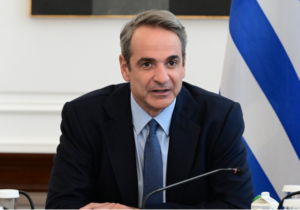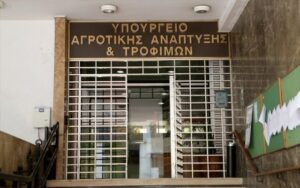The Prime Minister, in his regular weekly review, sent a message of unity and solidarity on the occasion of the 51st anniversary of the Polytechnic Uprising.
In his post, he made special mention of the significance of the struggle for “Bread-Education-Freedom,” emphasizing the timeless inspiration it offers for the defense of Democracy and the addressing of modern challenges, such as artificial intelligence and the climate crisis.
The Prime Minister extensively referred to government initiatives in the healthcare sector, focusing on the operation of free afternoon surgeries and the establishment of personal doctors, as well as on investments of 650 million euros for the upgrading of the National Health System (ESY).
At the same time, he announced measures to enhance employment for people with disabilities, as well as new initiatives to combat violence with minors as both perpetrators and victims, such as the operation of the Safe Youth App.
He also addressed energy prices, stating that “there is no chance we will allow excessive increases in wholesale electricity prices, which have been observed again in recent days in Southeastern Europe due to failures in the Single Energy Market, to pass on to the consumer.”
In his post, the Prime Minister also mentioned measures against price hikes, such as reducing the prices of essential goods and increasing the heating allowance, and referred to international challenges, stressing the need for energy transition with terms of competitiveness and citizen protection.
He did not forget to highlight Greek initiatives for adapting to artificial intelligence, announcing the upcoming presentation of proposals by a special committee.
In closing, the Prime Minister paid tribute to the great poet Michalis Ganas, who recently passed away, emphasizing the value of cultural heritage in collective memory and identity.
The Prime Minister’s post in detail:
“Good morning to all.
Today’s review coincides with the commemorative events for the 51st anniversary of the Polytechnic Uprising, a significant page in our modern history and a catalyst for its development. November of ’73, through the constant renewal of the demand for “Bread-Education-Freedom,” continues to inspire us and urge us to fight for a Greece that is even more modern and strong. A Greece that develops for the benefit of all its citizens. Our Democracy has taken root and progressed more than ever in the last fifty years, overcoming harsh trials, the most recent being the over-a-decade-long economic crisis. However, today it faces new challenges such as artificial intelligence and the climate crisis. Challenges that expand old inequalities and create new ones worldwide, making more urgent the reasonable demand of societies for the protection of their rights and faster fulfillment of their needs by their governments. However, the more complex the problems are, the more coordination is needed among political forces for the necessary solutions. This is, after all, what the Polytechnic taught us: unity and solidarity against the common enemy. Back then, it was the dictatorship; today, it is the rapid changes in our planet, the large and successive crises shaking the sense of security in societies. The minimum common denominator of our goals – despite our individual differences – is to implement policies that leave no one behind. This is what we are working for, and this is something that also comes through in today’s review, which I will now proceed with, starting with the field of public health.
We said it, and we are doing it. From November 28, free afternoon surgeries will begin, funded by the Recovery Fund. This involves a total of 37,000 procedures with no burden on our citizens, with priority given to those who have been waiting longer to undergo surgery. The goal, through the parallel digitization and central monitoring of the surgery list, is that by 2026 there will be no delay of more than 4 months for any surgery in the NHS.
Crucial for strengthening Primary Health Care and upgrading the NHS is the bill for the reform of the Personal Doctor institution, which was voted this week in Parliament. Our goal is for every citizen to have their own Personal Doctor, who will take care of their health as a whole, from prevention to referral to other doctors, and will monitor and update the patient’s digital file, which we will all soon have. We are also institutionalizing the Personal Pediatrician, where, in the first phase, 530,000 children will have free access for the first time. For the first time, financial incentives (40,000 euros as a lump sum at the level of gross earnings) will be provided to young doctors who choose to train in the specialties of General/Family Medicine or Internal Medicine in 2025, the specialties that “staff” the Personal Doctor. I would like to mention here that, in the past two years, we have managed to register about 5 million citizens in this institution. However, 44% of the insured were not included in the system because we do not have doctors in the specialties that can serve as Personal Doctors. This is exactly what we are trying to overturn with the financial incentives we are offering. Finally, very important is the establishment of 8 University Health Centers, one at each Medical School or Department in the country, where faculty members will serve. At these Centers, Telemedicine Stations will operate, and through the Telemedicine Network, 3,500 home care points will be created throughout the country. This way, no matter where someone lives, they will have access to health services.
Upgrading health structures with 650 million euros from the Recovery Fund, increasing the staff (in the last 5 years, 30,000 doctors, nurses, and administrative staff have been hired), and steadily improving wages (last year they increased by 10%) complement our plan for building the new NHS. It is an ongoing project, the results of which will become visible day by day. We do not celebrate, nor do we ignore the problems that still exist, but the reality is that yes, we are trying. And we will continue trying, even if this project is downplayed or even dismissed by the opposition, particularly by the party that claims the paternity of the NHS. The NHS does not change with words, it changes with actions.
As I mentioned in a previous review, the bill for the Personal Doctor also included the regulation of the Ministry of Labor for insured persons entitled to a main pension due to disability from a common disease, who will now receive it without needing to stop working, as was required until today. The regulation will be retroactive, effective from 1/1/2024, meaning that those who have submitted pension applications since the beginning of the year and were rejected because they had not discontinued their employment will be able, by submitting a new application within six months of the publication of the law, to have their cases reconsidered under the new regime. Our goal is to provide incentives for employment for people with disabilities and to remove any barriers keeping them away from the labor market.
I will continue with another policy that has a social dimension – neither right-wing, nor left-wing, nor centrist – and concerns our children and measures against violence with minors as perpetrators and victims. On Monday, the Safe Youth app was launched, a digital application that teenagers can download to their phones to call the police more quickly when they are in danger outside of school. How does it work? With the emergency button, which is constantly visible on the screen of the registered minor. One press of the button activates it, and with a second click, the user selects from a list of 4 incidents the type of danger. There is no need to call or speak. There is a geolocation system and prioritization by the Police to intervene swiftly.
Safety, however, starts with prevention. That’s why, alongside the Safe Youth app, we have developed the platform www.safeyouth.gov.gr, where children and parents can learn what constitutes abusive behavior and what does not, when one becomes a victim and when a perpetrator, and what a culture of safety and responsibility means in adolescent and adult life. This new prevention tool was implemented with the support of the Vodafone Foundation, which we thank, in collaboration with the Ministry of Citizen Protection and the Hellenic Police. It is an initiative that adds to other actions we have developed in recent years, such as the panic button for domestic violence, the stop-bullying.gov.gr for reporting bullying incidents in schools, and safehouses for the protection of vulnerable citizens from the threat of violence. I am not claiming that these will eliminate the problem. However, I believe that they represent significant steps that provide meaningful solutions and responses to the critical issue of growing violence that concerns us all. Just this year, the Hellenic Police have made 19,000 arrests of perpetrators (from 60 to 80 arrests every day) for cases of domestic violence, which are dealt with as a priority. Last year, in the corresponding period, the number was about 8,000. Thousands of Panic Buttons have been given to women, with the application having been used several times, and the Police intervening promptly. In one week, police officers across the country responded to 666 calls to the Emergency Response Center, and 113 women were provided with the Panic Button application. 4 victims were transferred to shelters by Hellenic Police vehicles and 14 victims to a medical examiner or hospital. Is this enough? No. The recent femicide in Agrinio saddened us all and showed us in the harshest way that, despite the measures, bad things can still happen. Every such loss is a tragedy that cannot be accepted. We do not rest. Every opportunity to improve the protection network will be utilized. And saving even one life is very important.
I will change the topic and move on to the issue of high prices, which continues to strain the family budgets of many households. Although, in the last six months, food inflation is below 1% – lower than the EU average – and specifically in supermarkets we have negative inflation between 1 and 2%, we will not stop our interventions for even lower prices. Supermarkets – responding to the Ministry of Development’s call – have announced a new list with another 523 products with reduced prices ranging from 5% to 24%. The goal is for at least 600 product codes to be included in the list by the end of the month. At the same time, fines for unfair profiteering have been sextupled, and we will expand the regulations for tackling misleading discounts, which the Ministry is discussing with market stakeholders.
Last Thursday, the Ministry of Development presented yet another reform that combines the simplification of administrative procedures for starting businesses with the digitization of all necessary steps. The digital platform Open Business is an idea that began 10 years ago and went through many phases and intermediate systems before being completed. Open Business brings all processes into a central information system, freeing up valuable time for entrepreneurs so that we can reduce the bureaucracy that troubles them and allow them to focus on what truly matters: production, extroversion, and innovation. Indeed, innovation characterizes the new platform, as the new system, among other things, supports interoperability with a number of other public sector digital systems, such as, for example, Taxisnet, e-paravolo, GEMI, and others. Additionally, beyond supporting notifications and approvals, it will also provide the ability to upload the required documents for licensing an activity. This is a major facilitation for every entrepreneur, but also a key feature that makes it easier for the administration to conduct checks. Furthermore, it integrates an expanded reporting system, which will be accessible to administrative bodies, collecting statistical data and information for policy implementation and business support. The new platform will be operational by December and covers 57 economic activities, expanding to new ones, corresponding to approximately 2,390 KADs. From the administration’s side, 850 bodies (municipalities, regional units, public sector bodies, etc.) have already been integrated into the system, and more are expected, with 2,500 individual users of the administration already trained to use the system.
Since I mentioned platforms being put into operation, I should also note that the AADE platform for the 2024-2025 heating subsidy is now open. The first installment of 150 million euros, which corresponds to 55% of the subsidy, will be paid on December 23. The remaining 45%, amounting to 120 million euros, will be paid at the end of May after weather data from the 12,000 points into which the country is divided are factored in. This year, the heating subsidy has increased by 20% for those using electricity for heating. Additionally, we have raised the maximum amount of support from 1,000 euros to 1,200 euros for residents in areas with low temperatures, with an emphasis on more mountainous areas. The subsidy ranges from 100 euros as a minimum amount, while the maximum reaches 800 euros per household.
At this point, let me reassure you that there is no way we will allow excessive increases in wholesale electricity prices to be passed on to consumers, which have been observed again in recent days in Southeastern Europe due to failures in the Single Energy Market. I remind you that, at Greece’s initiative, supported by Romania and Bulgaria, this issue of these unacceptable dysfunctions, which are primarily due to the lack of connections between Central Europe and Southeastern Europe, was officially raised with the President of the European Commission. I know that it is not easy to quickly make the necessary institutional interventions, but a permanent mechanism is needed that will not allow excessive profits at the expense of consumers and businesses. Next Friday, a relevant delegation from the European Commission will come to Athens to discuss this issue urgently, which I also raised at the Climate Conference in Baku.
I will continue with this UN Climate Change Conference. It was an opportunity to take stock of what we have achieved and to rethink how to move forward. I had the chance to present at the Conference, first of all, the progress and commitment of our country to the energy transition, a sector in which we are pioneers as Greece has achieved the greatest reduction of carbon dioxide in all of Europe. In order to proceed, we must put this transition on firmer ground. The challenge is how we can achieve “greening” while simultaneously reducing the cost of transition and improving the competitiveness of our economy, so that both citizens and businesses can bear it. The dilemma concerns all of Europe. Should we follow a path that is advancing at a very fast pace and leading to a reduction in our competitiveness, or a path that progresses a little more slowly, but allows the industry to adjust and thrive? I believe that Europe must refocus on the internal energy market and invest in the networks which, as the Draghi report emphasizes, are a European public good. There is no internal market without the massive expansion of electricity transmission capacity in Europe.
And a Greek “moment” in Baku. In a special discussion, the 112 emergency number was presented as a good international practice, which has proven to save lives in many cases of natural disasters. I explained, however, that in order for it to be effective, it requires building trust-based relationships with local authorities and civil protection services.
I will stay on international issues for a moment. Following the results of the American elections and the trade policy that President Trump intends to implement, the discussion on the “counteroffensive” that Europe must launch in defense, energy, and digital innovation sectors has been reignited if it wants to remain a significant global economic power and geopolitical player. The initiative to create an AI Factory is moving in the right direction, and I am glad that Greece is one of the first countries to officially apply to participate in this mega-project to make our continent a global leader in the field of supercomputers. The benefits of this initiative are manifold and affect many sectors: from medicine, meteorology, and cybersecurity to the protection of critical infrastructure and industry. All of these translate into many well-paid jobs in cutting-edge fields. Artificial intelligence is already the “key” in the global economic competition. As a country, we must not just adapt, but look at how we can make a leap in productivity by integrating artificial intelligence more quickly and effectively in many areas of policy. Soon, we will present the findings from the special committee we established for artificial intelligence with proposals for Greece’s digital future.
In closing, I would like to mention Michalis Ganas, who passed away a few days ago, having secured a prominent place in the pantheon of our great contemporary poets. I bid him farewell with some of his own lines from the great legacy he left us: “…This light does not diminish from Homer’s time and dances like an archangel above the curly wave.”
It was indeed a great review, and I hope I haven’t tired you too much. Thank you very much for your time, I wish you a good Sunday and a good week!”
Ask me anything
Explore related questions





